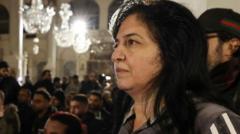Protests erupted in Syria following the burning of a Christmas tree in Suqaylabiyah, a predominantly Christian town near Hama. Disturbing footage shared on social media captured masked individuals igniting the tree, prompting widespread public outcry.
The Islamist faction that recently took power, known for leading the uprising against former President Bashar al-Assad, condemned the act, claiming the individuals responsible were foreign fighters who have since been apprehended. The faction assured the community that efforts would be made to restore the damaged tree swiftly.
Across Syria, thousands rallied in various cities, demanding that the new leadership safeguard the rights of religious minorities. In Damascus's Bab Touma neighborhood, protesters rallied with crosses and Syrian flags, vocally expressing their commitment to their faith. A demonstrator named Georges expressed his sentiments to the AFP, stating, “If we're not allowed to live our Christian faith in our country, as we used to, then we don't belong here anymore.”
Syria is characterized by its rich tapestry of ethnic and religious groups, including Kurds, Armenians, and Christians, among others, with Sunni Muslims forming the majority. The recent changes in leadership have raised fears over the future treatment of these minorities.
As the country navigates its new political landscape, the governing strategies of Hayat Tahrir al-Sham (HTS)—which has a controversial history yet aims to position itself as a more inclusive force—are still unclear. HTS has declared its intention to create a country that accommodates all Syrians, positioning itself as a defender of minority rights amidst ongoing skepticism.
Despite their declared objectives, HTS is still classified as a terrorist organization by many international bodies, complicating the current geopolitical discourse. In a notable diplomatic shift, the US recently lifted a hefty bounty on HTS leader Ahmed al-Sharaa, signaling possible changes in foreign relations.
Amid these developments, the presence of various extremist factions, foreign combatants, and the enduring legacy of the Assad regime pose significant challenges for the new administration as Syria's diverse population clamors for stability and protection of all religions.





















